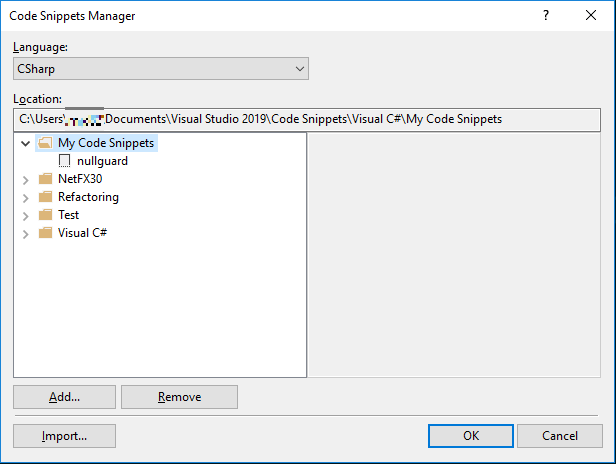Snippets to Fix FxCop CA1062
If you run FxCop you may frequently run into CA1062: Validate arguments of public methods. Below are three snippets to make writing this boiler plate a bit easier.
Before we get to the snippets, if you are in a position to disable CA1062 and still want thorough null checks, you might consider using IL weaving with Fody to automate the addition of null checks.
Example
Here is a quick example. This public method uses input before validating that it is not null. This results in the error shown below.
1
2
3
4
5
6
7
8
9
10
public class FxCopTest
{
public static void MissingValidation(string input)
{
if (input.Length != 0)
{
Console.WriteLine(input);
}
}
}

Snippets
The snippets below all provide the same functionality, but differ in their style.
To install the snippet in Visual Studio.
- Press Ctrl+K, Ctrl+B to open the Code Snippet Manager, where you can get the path to the
Visual C#\My Code Snippets. - Save the selected snippet with any name, and the
.snippetfile extension. - You may need to restart Visual Studio for the snippet to become available.

Usage for each snippet is the same:
- Type
nullguardor enough of the name that IntelliSense selectsnullguard. - Hit tab twice.
- Type the name of the argument to check and press enter/return.
Each option below shows example output from the snippet, along with the snippet itself.
Default Option
Note, this snippet is not safe to use with StyleCop. See the next option.
1
if (input == null) throw new ArgumentNullException(nameof(input));
1
2
3
4
5
6
7
8
9
10
11
12
13
14
15
16
17
18
19
20
21
22
23
24
25
<?xml version="1.0" encoding="utf-8" ?>
<CodeSnippets xmlns="http://schemas.microsoft.com/VisualStudio/2005/CodeSnippet">
<CodeSnippet Format="1.0.0">
<Header>
<Title>nullguard</Title>
<Shortcut>nullguard</Shortcut>
<Description>Code snippet for performing null check.</Description>
<Author>Mike Conrad - https://www.mjconrad.com/</Author>
<SnippetTypes>
<SnippetType>Expansion</SnippetType>
</SnippetTypes>
</Header>
<Snippet>
<Declarations>
<Literal>
<ID>argument</ID>
<ToolTip>Argument to check for null</ToolTip>
<Default>argument</Default>
</Literal>
</Declarations>
<Code Language="csharp"><![CDATA[if ($argument$ == null) throw new ArgumentNullException(nameof($argument$));]]>
</Code>
</Snippet>
</CodeSnippet>
</CodeSnippets>
StyleCop Safe Option
This snippet avoids avoids violating these two StyleCop rules:
- SA1503 - Braces should not be omitted
- SA1501 - Statement should not be on a single line
1
input = input ?? throw new ArgumentNullException(nameof(input));
1
2
3
4
5
6
7
8
9
10
11
12
13
14
15
16
17
18
19
20
21
22
23
24
25
<?xml version="1.0" encoding="utf-8" ?>
<CodeSnippets xmlns="http://schemas.microsoft.com/VisualStudio/2005/CodeSnippet">
<CodeSnippet Format="1.0.0">
<Header>
<Title>nullguard</Title>
<Shortcut>nullguard</Shortcut>
<Description>Code snippet for performing null check.</Description>
<Author>Mike Conrad - https://www.mjconrad.com/</Author>
<SnippetTypes>
<SnippetType>Expansion</SnippetType>
</SnippetTypes>
</Header>
<Snippet>
<Declarations>
<Literal>
<ID>argument</ID>
<ToolTip>Argument to check for null</ToolTip>
<Default>argument</Default>
</Literal>
</Declarations>
<Code Language="csharp"><![CDATA[$argument$ = $argument$ ?? throw new ArgumentNullException(nameof($argument$));]]>
</Code>
</Snippet>
</CodeSnippet>
</CodeSnippets>
Helper Class Option
The last option uses a helper class
1
NullGuard.Check(things, nameof(things));
1
2
3
4
5
6
7
8
9
10
11
12
13
14
15
public static class NullGuard
{
/// <summary>
/// Throws an <see cref="ArgumentNullException"/> if the provided argument is null.
/// </summary>
/// <param name="argument">Argument to check.</param>
/// <param name="name">Original name of the argument.</param>
public static void Check(object argument, string name)
{
if (argument == null)
{
throw new ArgumentNullException(name);
}
}
}
1
2
3
4
5
6
7
8
9
10
11
12
13
14
15
16
17
18
19
20
21
22
23
24
25
26
<?xml version="1.0" encoding="utf-8" ?>
<CodeSnippets xmlns="http://schemas.microsoft.com/VisualStudio/2005/CodeSnippet">
<CodeSnippet Format="1.0.0">
<Header>
<Title>nullguard</Title>
<Shortcut>nullguard</Shortcut>
<Description>Code snippet for performing null check.</Description>
<Author>Mike Conrad - https://www.mjconrad.com/</Author>
<SnippetTypes>
<SnippetType>Expansion</SnippetType>
</SnippetTypes>
</Header>
<Snippet>
<Declarations>
<Literal>
<ID>argument</ID>
<ToolTip>Argument to check for null</ToolTip>
<Default>argument</Default>
</Literal>
</Declarations>
<Code Language="csharp"><![CDATA[if ($argument$ == null) throw new ArgumentNullException(nameof($argument$));]]>
</Code>
</Snippet>
</CodeSnippet>
</CodeSnippets>


Leave a Comment
Your email address will not be published. Required fields are marked *